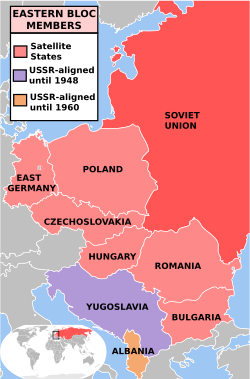
Interventionism, in international politics, is the interference of a state or group of states into the domestic affairs of another state for the purposes of coercing that state to do something or refrain from doing something. [1] The intervention can be conducted through military force or economic coercion. A different term, economic interventionism, refers to government interventions into markets at home. [2]
Contents
- Foreign-imposed regime change
- By country
- China
- Cuba
- Egypt
- Ethiopia
- France
- India
- Indonesia
- Iran
- Israel
- Nigeria
- Russia
- Saudi Arabia
- Soviet Union
- Turkey
- United Arab Emirates
- United States
- See also
- References
- Further reading
- External links
Military intervention, which is a common element of interventionism, has been defined by Martha Finnemore in the context of international relations as "the deployment of military personnel across recognized boundaries for the purpose of determining the political authority structure in the target state". Interventions may be solely focused on altering political authority structures, or may be conducted for humanitarian purposes, or for debt collection. [3]
Interventionism has played a major role in the foreign policies of Western powers, particularly during and after the Victorian era. The New Imperialism era saw numerous interventions by Western nations in the Global South, including the Banana Wars. Modern interventionism grew out of Cold War policies, where the United States and the Soviet Union intervened in nations around the world to counter any influence held there by the other nation. [4] Historians have noted that interventionism has always been a contentious political issue in the public opinion of countries which engaged in interventions. [5]
According to a dataset by Alexander Downes, 120 leaders were removed through foreign-imposed regime change between 1816 and 2011. [6] A 2016 study by Carnegie Mellon University political scientist Dov Haim Levin (who now teaches at the University of Hong Kong) found that the United States intervened in 81 foreign elections between 1946 and 2000, with the majority of those being through covert, rather than overt, actions. [7] [8] Multilateral interventions that include territorial governance by foreign institutions also include cases like East Timor and Kosovo, and have been proposed (but were rejected) for the Palestinian territories. [9] A 2021 review of the existing literature found that foreign interventions since World War II tend to overwhelmingly fail in achieving their purported objectives. [10]




